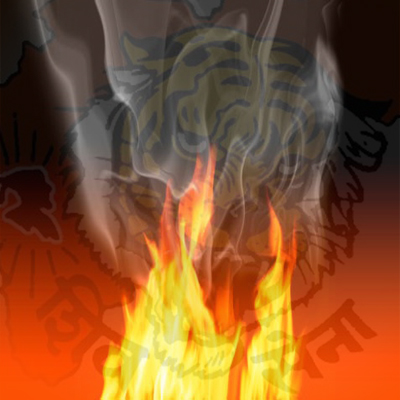Nashik, Oct 18: A 65-year-old woman has accused three men of setting her on fire for not voting for a candidate they were backing for the Maharashtra assembly, in a police complaint, in Babhulgaon Khurd village in Yeola, around 90km from Nashik. She is battling for her life with 80% burns.
 On the basis of Zelubai Jagannath Wable's complaint, police arrested Ashok Bornare (38), Pandurang Bornare (45) and Nandkishore Bhurak (40) on Friday for attempt to murder and criminal intimidation. They were produced before a Yeola court and remanded in police custody till October 20.
On the basis of Zelubai Jagannath Wable's complaint, police arrested Ashok Bornare (38), Pandurang Bornare (45) and Nandkishore Bhurak (40) on Friday for attempt to murder and criminal intimidation. They were produced before a Yeola court and remanded in police custody till October 20.
Wable said the three accused met her on Wednesday afternoon while she was on her way to cast her vote. She said they told her to press the "third button" on the EVM, which was in the name of Shiv Sena's Sambhaji Pawar.
Wable told cops that the three met her again outside the polling booth and threatened to kill her, saying they had seen she had pressed the second button, which was in the name of NCP's Chhagan Bhujbal.
She then told cops that three men came to her house on Thursday around 8pm and abused her. Then, Bhurak held her while Ashok Bornare emptied a jerry can of kerosene on her and Pandurang Bornare set her ablaze.
DSP Naresh Meghrajani said, "Prima facie, the woman's version doesn't appear convincing. Things will be clear during the interrogation of the accused in police custody."
Wable's son, Raghunath, a farmer, said his mother was accusing people who had come to save her. He said she had told him that her saree had caught fire while she was cooking inside the house.
SP Sanjay Mohite said, "We will verify every aspect of various statements. According to the victim, the accused entered the polling booth and saw her cast her vote. If that was the case, representatives of other parties would have objected. All these things would be part of the investigations. Even if she retracts her statement, it would not affect our investigations."
Police said that one Santosh Garge, related to Wable, and who lives near her home, heard her cries for help and tried to douse the fire by wrapping her in a quilt. He later called Wable's daughter, who lives in another village, and the matter was reported to the police. Wable was taken to the Yeola rural hospital and shifted to the Nashik civil hospital at around 1.30 am on Friday.
DSP Meghrajani said, "The three were arrested on the basis of the woman's statement. There's no eyewitness and we also have to ascertain how the three accused came to know that she had not pressed the button they had told her to. None of the three men has any political affiliation or criminal record. They told us they were not even at the spot where the incident took place."
Of the three accused, Ashok Bornare is an ex-servicemen while the other two are farmers. Wable's son Raghunath said, "There's no point involving innocent villagers in the case. I spoke to my mother, who said she was cooking inside the house when the 'pallu' of her saree caught fire. She ran out of the house after that. My mother may have wrongly taken the names of the three men when she was in pain."
Meghrajani said while Wable could change her statement as per legal provisions, the police would consider the circumstances in which the statements were given.
The main electoral battle in Yeola is between Bhujbal and Pawar, the latter being the nephew of former Congress MLA Maruti Pawar, who had won in 1985 and 1990. Two days before polling, Nivrutti Lahare of the Congress had declared his support to Bhujbal. Former Sena MLA Kalyanrao Patil, who had won the seat in 1995 and 1999, was an aspiring candidate from the BJP. However, the BJP denied him the ticket. The MNS initially decided to give Patil the candidature but backed out at the last minute.





Comments
Add new comment